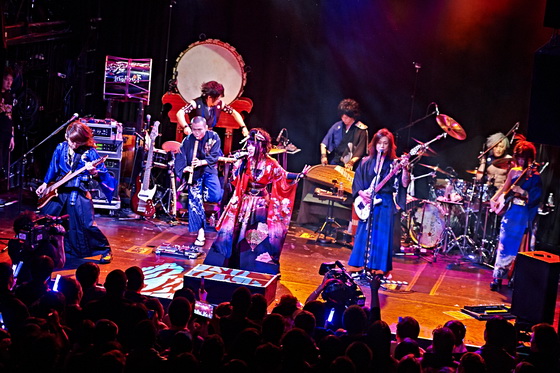Made in Japan (english)
Írta: Galgóczi Tamás | 2016. 05. 29.

I think they really know something in the Empire of the Rising Sun.
If a band becomes renown and successful in their homeland due to their talent, their skills, some talent show, a good media campaign or just mere luck, well, there is nothing surprising about that. But if they want to stand a chance in an international environment, and have achievements worth mentioning there, I think they need a lot more than just luck. And no matter how I look at it, in the past two or three years there have been at least two Japanese bands that have successfully completed this challenge (i.e. to become renown abroad).
First, I have to mention a group named Babymetal – there had been disagreements about them among our website’s writers. Some of them thought the band is no more than a simple marketing trick without any depth: three gorgeous girls on a stage with some people in the background who look like musicians – and the audience buys it. The other side says the complete opposite: they are a real music group with actual songs, no lip syncing, and here for a long run, not just for the duration of a marketing thunderstorm. The latter opinion was proven right.
If I wanted to downgrade their achievements, I would say it’s their novelty that sells them; they don’t really do anything special, and there are a lot of metal bands in Europe who are a lot more talented. I can’t really argue with these statements, but it is a fact that Babymetal’s first record (the first that was thought to be good) wasn’t issued as an import in Europe, but released by a middle-sized local record company. Furthermore, there are the music videos (especially the one with the chocolate), which I think almost everyone has seen who is at least a little bit interested in Japanese music or metal. It’s due to these two factors that they have become popular in the genre on the continent, and thus I’m not surprised they had a tour in Western Europe with pretty good audience numbers.
I think nobody argues the fact that their presence on stage is novel/exotic enough – especially compared to the stage visuals that are popular nowadays and maybe even became a bit corny – and is well-remembered by people who get to see them live. Even though Babymetal didn`t come up with anything surprising on that front, if we take into consideration other Japanese groups, but they use J-pop boy- and girl band choreographies very well, and thus put the three singers in focus. Before we get too lost in the visuals, I want to quickly add that their music is also worth noting, as a musician friend of mine put it, „it is really something to write home about”. It is not unendurably strange, and not blandly common enough to be lost among the innumerable records released every month. In other words, it is refreshingly new and different.
Let’s not forget that their first record is not the only one, the second is coming out at the beginning of April, they did way more than just the one tour, and it seems that they have every chance to become even more popular. What happened to the Beatles happened to them as well, which I believe is very important in the US: they got invited to a TV show to perform live (you can see the video below, and yes, the sound quality is awful). Millions of Americans saw them for the first time, and although I don`t think that they will be received with such frenzy on their world tour (starting this April) as the four guys with the mushroom-haircut did in their time, but this is an achievement in itself. I’m dying to know how the unprepared audience dealt with such culture shock. It was, after all, metal, with Japanese lyrics and tiny girls, which altogether just may prove to be too much of a good thing.

Babymetal is not the only band with such success, the next example is my personal favourite, the Wagakkiband, who combine Japanese folk music with metal – electronic instruments with traditional ones. They became internationally renown musicians from local heroes in about three years. They only needed two records, a concert DVD (published this April) and a bunch of music videos to do that. Had they become successful only in Japan, I’d say this is believable, because they are talented enough, and their presence on stage is nothing but impressive. They very much deserved their deal with a huge record company, but it seems that they are not content with that, and aim to conquer the West, thanks to their abilities and the novelty of their music.
The latter is worth emphasizing, as I don’t think anybody without talent are invited to the SXSW festival, where the competition is extremely tough, and where only the bands that have the promise for more than mediocre get to attend. I don’t think this festival is widely known here, so let me briefly introduce it. More than a thousand bands perform in a couple of days representing a variety of genres, including world music, alternative, electronic, hip-hop, tejano etc. There are also music film screenings, talks, conferences and lots of other complementary events. You can check it out here.
For Wagakki this was only the beginning of a journey: not only did they perform in Austin, but in New York, as well. The latter concert meant that they weren’t only seen by the local Japanese community, but were able to reach a new audience, and gained new fans. A lot more people were able to see the magic they create on stage, and I hope this is only the beginning and that I can also see them live in Europe, or maybe, as the cherry on top of everything, in Hungary.

I don’t mean to say that from now on we have to watch out for Asia for musical redemption, but I believe Japanese bands have the potential to bring a fresh sound and inspire us at any given time. I could link a list of concert organisers to prove how many and what a wide range of musical tours are going on in Europe and in the US right now that are connected to Japan or Asia one way or another, but I’m not going to. It`s enough to say there are a lot more than you would imagine.
Personally I’m happy about that, because I think one of the benefits of globalisation is that it brings the music of the world closer to us. It is due to this that we can listen to music that is good or even excellent, and sound fantastic not only on record but live, too – music that we never would have gotten the chance to know otherwise.
Originally written by: Tamás Galgóczi
English version by: Sarolta Szabó